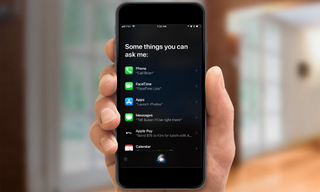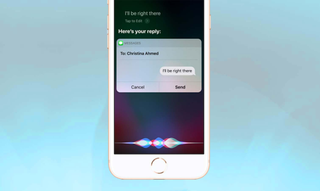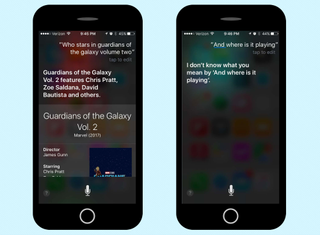Here's Why Siri Is Getting Its Butt Kicked by Alexa
A new report reveals the troubled path from Siri's launch to Apple losing its lead to Amazon and Alexa.
Ever wonder why Alexa is so far ahead of Siri? How Apple lost the voice assistant race to Amazon despite having a head start?

Now we know, thanks to a new report featuring insight from 12 former Apple employees, who revealed years of inner turmoil at the Cupertino-based Mac maker.
In a story published by The Information yesterday (Mar. 14) Siri's failings are tied to a rampant lack of communication and clashing personalities. The big picture, it seems, is that a constant shuffle of managers and team leaders kept the digital assistant from having a consistent steward, and preventing developers from harnessing Siri's potential, something that has helped Alexa soar.
Siri's rocky start is called out by one former Siri team member, comparing it to Alexa: "When Alexa shipped, it was rock solid from day one … For Siri to get there, they almost need to set everything aside and start over." Yes, that's right, the people who saw the inner workings of Siri think Apple should junk it and start from square one.
"When Steve died the day after Siri launched, they lost the vision … They didn’t have a big picture."
The acquisition days, and early, pre-release moments, were positive, as Steve Jobs convinced Siri Inc.'s founders to be acquired by Apple. Norman Winarsky (who helped found Siri Inc.) said Mr. Jobs "motivated the team enormously," and "made them believe they could make a ding in the universe. He made us all believe that."
But the vision of Siri's creators would erode before Apple even released it, as their plan to make an "App Store for AI" — which sounds similar to Alexa's Skills repository — got shelved. Instead, "Jobs wanted Siri to focus on a few things that only Apple would have complete control over," and "early Siri team members said [Jobs] promised them that they’d be able to work on building out a third-party ecosystem later." That has yet to happen, at least in earnest.
One ex-employee blames the failure to properly deliver on Siri on the post-Jobs Apple: "When Steve died the day after Siri launched, they lost the vision … They didn’t have a big picture."
Sign up to get the BEST of Tom's Guide direct to your inbox.
Here at Tom’s Guide our expert editors are committed to bringing you the best news, reviews and guides to help you stay informed and ahead of the curve!

While Apple senior vice president Scott Forstall was to lead the team, he soon delegated this responsibility to focus on Apple Maps, by handing Siri duty to Richard Williamson, who worked with Forstall on Apple Maps.
While "several former employees" claim Mr. Williamson's decisions — including one to limit the introduction of Siri features to a once-annual cycle — clashed with the team, Williamson told The Information that this was not true.
“After launch, Siri was a disaster," Mr. Williamson wrote. "It was slow, when it worked at all. The software was riddled with serious bugs. Those problems lie entirely with the original Siri team, certainly not me."
Siri Inc. CEO Dag Kittlaus tweeted in response: “This statement, wholly false, was made by the architect and head of the biggest launch disaster in Apple history, Apple Maps. In reality Siri worked great at launch but, like any new platform under unexpectedly massive load, required scaling adjustments and 24 hour workdays."
Those 24-hour workdays came from infrastructure problems, as Apple apparently hadn't prepared for the amount of traffic that would come from Siri. Even worse, a lot of the flaws seem to be related to the code as, one employee remembered "a Siri task that originally needed 500 servers coming down to only five servers after improving the code."

Then, Luc Julia, who had worked with Siri co-founder Adam Cheyer in the 1990s, was brought on to solve the team's management issues. Mr. Julia, though, clashed with Forstall, who pushed for Mr. Julia to be let go, which happened before a year passed in his time running Siri. Problems between Williamson and the Siri team eventually led to the departure of Cheyer who was "among the most zealous proponents of getting Siri to reach its potential."
That same year (2012), Forestall and Williamson both left Apple, after the Apple Maps fiasco was a black mark on the company's reputation. Then, Apple brought in Bill Stasior, a key figure in Amazon's search unit with a Ph.D. in computer science from MIT, to run Siri. But he was also doing a lot of work in search, and the combination of the two seemingly became too much for one man.
MORE: Alexa vs. Siri vs. Google Assistant: Which Smart Assistant Wins?
Stasior led Apple's 2013 decision to purchase Topsy, a Twitter search tool that would be used in both Siri and Spotlight, Apple's system search tool. Unfortunately, the Topsy team didn't want to work with the Siri team, which they "viewed as slow and bogged down by the initial infrastructure that had been patched up but never completely replaced since it launched."

Trying to solve Siri's natural language processing abilities, Apple tried to outsource work to the Nuance firm in Boston, before hiring Alex Acero away from Microsoft, where he worked in speech recognition. It then tried to solve the team with another acquisition in 2013, the Novauris speech startup.
Those teams would work together for only 6 months before splitting up. And then Amazon launched the Echo and Alexa, and Apple was caught in the lurch, their milkshake having been consumed, to borrow a phrase from There Will Be Blood.
According to two Siri team members, "their team didn’t even learn about Apple’s HomePod project until 2015—after Amazon unveiled the Echo in late 2014." This may (according to a source) be attributable to an Apple plan to launch the HomePod without Siri.
Sure, Apple's delivered SiriKit to help developers use Siri, but it's potential has yet to be fulfilled. Apple's closed nature on Siri continues to show in the cracks of its seams, as Spotify still can't use the virtual assistant.
The sources speaking to The Information echo a chorus that Apple users and enthusiasts have heard and said for years: "The company’s commitment to creating flawless online services is less of a priority than designing transformational hardware, and that can cause problems for a project as complex as the one Mr. Stasior manages."
Credit: Tom's Guide

Henry is a managing editor at Tom’s Guide covering streaming media, laptops and all things Apple, reviewing devices and services for the past seven years. Prior to joining Tom's Guide, he reviewed software and hardware for TechRadar Pro, and interviewed artists for Patek Philippe International Magazine. He's also covered the wild world of professional wrestling for Cageside Seats, interviewing athletes and other industry veterans.